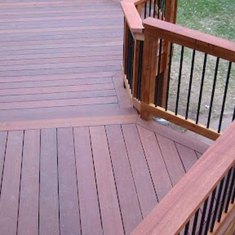Building a new deck is a great way to add value and outdoor living space to your home. But one of the most important decisions you'll make is choosing the best decking material. The right choice ensures that your deck will not only look beautiful but also stand up to the elements for years to come. At Cedar Supply, a leading lumber company in northern Colorado, we’ve helped countless customers find the perfect deck options. In this article, we'll break down the various decking materials, the most durable choices, and what to consider when selecting the best outdoor decking material.
What is the Best Deck Material?
When planning a new deck, one of the most important decisions you'll make is choosing the right material. With so many options available, it can be overwhelming to decide which is best for your needs. So, what is the best deck material for your project? Let’s explore the top choices to help you make an informed decision!
When deciding on the best decking material, there are several factors to consider. Durability, cost, appearance, and maintenance are all important aspects. The best material to build a deck will depend on your specific needs and environment. For example, some homeowners prioritize a natural wood look, while others are more concerned with long-term performance and ease of maintenance.
By comparing deck material options, you can weigh the pros and cons of each. While traditional wood decking has its charm, more modern materials like composite or PVC can offer better longevity with less upkeep.
Types of Decking Material
There are many types of decking material to choose from, each with its own unique benefits and drawbacks:
Wood Decking
Wood is a classic choice, offering natural beauty and a timeless feel. Popular options like cedar, redwood, and pressure-treated lumber are known for their warm look but require regular maintenance, like staining and sealing.
- Cedar and Redwood: Naturally resistant to rot and insects but need upkeep to maintain their color and durability.
- Pressure-Treated Lumber: Budget-friendly and durable but can warp over time and requires regular care.
Composite Decking
Composite decking combines wood fibers and plastic, offering a low-maintenance option that resists warping, cracking, and moisture damage. This type of decking material mimics wood’s look without the hassle of sealing or staining.
- Pros: Low maintenance, weather-resistant, insect-resistant.
- Cons: Higher upfront cost, can get hot in direct sunlight.
PVC Decking
Fully synthetic, PVC is highly resistant to moisture, mold, and insects. It’s a great choice for areas with high humidity or rain.
- Pros: Low maintenance, moisture-resistant, lightweight.
- Cons: Higher cost, less natural appearance, more expansion and contraction
Aluminum Decking
Aluminum is extremely durable, rust-proof, fire-resistant, and slip-resistant. It's perfect for modern designs and harsh weather conditions.
- Pros: Long-lasting, low maintenance, eco-friendly.
- Cons: High cost, less traditional look, less availability
Consider your climate, budget, and desired maintenance level when selecting materials to build a deck. Wood offers a natural look but requires upkeep, while composite and PVC offer low-maintenance solutions. Aluminum is ideal for durability and modern designs.
What is the Most Durable Decking Material?
When building a deck, durability is often a top concern, especially if your deck will be exposed to harsh weather conditions or heavy foot traffic. Choosing a material that can withstand the elements while maintaining its appearance is crucial for long-term enjoyment and minimal upkeep. But what is the most durable decking material available?
- Composite Decking: Resistant to warping, rotting, and insect damage, composite decking is a strong contender for durability. Plus, it doesn’t fade or need constant upkeep.
- PVC Decking: Even more resistant to moisture and decay, PVC is ideal if you're looking for low-maintenance outdoor deck material that holds up well over time.
- Aluminum Decking: While it’s the most expensive option, aluminum is incredibly durable and resistant to all types of weather.
Each of these outdoor deck material options offers long-term benefits, making them a smart choice for homeowners looking to minimize maintenance while maximizing lifespan.
What is the Best Material to Use for Decks?
The best material to use for decks depends on your preferences for durability, maintenance, and budget, with top options including natural wood, composite, PVC, and aluminum. While wood offers a classic look, modern materials like composite, PVC, and aluminum provide longevity and ease of care.
At Cedar Supply, we help homeowners across northern Colorado select the perfect decking materials for their projects. Whether you're interested in traditional wood or newer, low-maintenance options, we can guide you through the deck material comparisons to make the best choice for your home.
Not ready to tackle the job yourself? No problem. Cedar Supply can provide you with a list of professional Fort Collins installation contractors throughout northern Colorado.
By considering your options carefully, you can ensure that your new deck will be a beautiful and durable addition to your home. Let us help you find the best decking boards for your project today!
